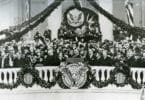Early Life and Background
John Tyler was born on March 29, 1790, at Greenway Plantation in Charles City County, Virginia. He was the sixth of eight children born to John Tyler Sr., a prominent Virginia planter, judge, and friend of Thomas Jefferson and Mary Armistead Tyler. Growing up in a family deeply rooted in Virginia’s political and social elite, Tyler was groomed early for a life of public service.
Tyler attended the College of William and Mary, graduating in 1807 at 17. He then studied law under his father’s tutelage and was admitted to the Virginia bar in 1809. Tyler quickly established himself as a successful lawyer, but his passion for politics soon drew him into public life.
Early Political Career
Tyler’s political career began in the Virginia House of Delegates, where he served from 1811 to 1816. His tenure in the state legislature was marked by his strong advocacy for states’ rights and limited federal government, defining his political philosophy throughout his career. Tyler’s eloquence and steadfast adherence to his beliefs earned him respect and recognition among his peers.
1816, Tyler was elected to the U.S. House of Representatives, where he served until 1821. During his time in Congress, he continued championing states’ rights and opposed measures overstepping federal authority, such as the Second Bank of the United States. After a brief political hiatus, Tyler returned to serve as the Governor of Virginia from 1825 to 1827. His tenure as governor further solidified his reputation as a staunch defender of states’ rights and limited government.
Rise to National Prominence
Tyler’s national prominence grew when he was elected to the U.S. Senate in 1827. As a senator, he maintained his commitment to states’ rights and often found himself at odds with President Andrew Jackson’s policies. Tyler’s opposition to Jackson’s use of executive power, particularly his handling of the national bank and tariff issues, led him to break with the Democratic Party and join the emerging Whig Party.
Tyler’s principled stance against what he perceived as executive overreach earned him a reputation as a man of conviction, but it also made him a political maverick. In 1836, he resigned from the Senate in protest against a resolution censuring Jackson’s removal of federal deposits from the national bank. This defiance endeared him to the Whigs, who admired his willingness to follow his principles.
The Vice Presidency and Path to the White House
In the 1840 presidential election, the Whig Party sought to capitalize on the growing discontent with the Democratic administration of Martin Van Buren. They nominated William Henry Harrison, a war hero, for president and John Tyler as his running mate. The campaign, known for its slogan “Tippecanoe and Tyler Too,” emphasized Harrison’s military achievements and Tyler’s commitment to states’ rights.
The Whig campaign was a resounding success, and Harrison and Tyler won by a landslide. Tyler assumed the role of vice president, a position he viewed primarily as ceremonial. However, fate had other plans. Just 31 days into his presidency, Harrison died of pneumonia, making Tyler the first vice president to ascend to the presidency upon the death of a sitting president.
Presidency (1841-1845)
Assumption of the Presidency
Tyler’s sudden rise to the presidency in April 1841 was met with uncertainty and controversy. The U.S. Constitution was vague on the issue of presidential succession, leading to questions about whether Tyler should assume the full powers of the presidency or merely serve as an acting president. Tyler declared himself the rightful president and took the oath of office, setting a crucial precedent for future succession.
Tyler’s assertion of presidential authority faced resistance from members of his own party. The Whigs, who had expected Harrison to be a pliable figurehead, were dismayed by Tyler’s independence and refusal to follow the party line. This tension between Tyler and the Whig leadership would define much of his presidency.
Domestic Policy and Party Conflicts
One of Tyler’s first significant actions as president was to veto two bills to establish a new national bank, which were central to the Whig Party’s economic agenda. Tyler’s opposition to the bank stemmed from his strict interpretation of the Constitution and belief in states’ rights. These vetoes infuriated the Whigs, leading to a complete breakdown in relations between Tyler and his party. In response, all but one of Tyler’s cabinet members resigned, and the Whigs expelled him from the party.
Despite his lack of party support, Tyler pursued a domestic agenda that reflected his political beliefs. He advocated for reducing tariffs, believing lower tariffs would benefit Southern agriculture and promote free trade. In 1842, he signed the Tariff of 1842, which, although it raised tariff rates, was a compromise that averted a potential fiscal crisis.
Tyler also worked to address issues related to westward expansion and the settlement of public lands. He supported the Preemption Act of 1841, which allowed settlers to claim and purchase land before it was sold by the government. This act encouraged westward migration and helped shape the nation’s expansionist policies.
Foreign Policy Achievements
While Tyler’s domestic policy was marked by conflict and controversy, his foreign policy achievements were more successful. One of his most notable accomplishments was the annexation of Texas. Texas had declared its independence from Mexico in 1836 and sought to join the United States. However, the issue of annexation was contentious, as it raised concerns about the expansion of slavery and potential conflict with Mexico.
Undeterred, Tyler pursued annexation with determination. In 1844, he signed a treaty to annex Texas, but it failed to gain the necessary two-thirds majority in the Senate. Tyler then took an unconventional route, using a joint resolution of Congress to achieve annexation. The resolution passed in early 1845, and Texas was admitted to the Union shortly before Tyler left office.
Tyler’s presidency also saw significant developments in U.S.-British relations. In 1842, he signed the Webster-Ashburton Treaty, which resolved several border disputes between the United States and British North America (now Canada). The treaty established the boundary between Maine and New Brunswick, addressed issues related to the Great Lakes, and improved diplomatic relations between the two nations.
Post-Presidency
After leaving office in 1845, Tyler retired to his plantation, Sherwood Forest, in Virginia. Despite his political isolation during his presidency, Tyler remained active in public affairs. He continued to advocate for states’ rights and Southern interests, increasingly aligning himself with the pro-slavery faction as tensions between the North and South escalated.
Tyler’s political career dramatically turned during the secession crisis of 1860-1861. As Southern states began to secede from the Union, Tyler initially sought a peaceful resolution through the Washington Peace Conference, which he chaired. However, Tyler cast his lot with the Confederacy when efforts to prevent secession failed. He was elected to the Confederate House of Representatives but died before he could take his seat.
Personal Life and Character
John Tyler married Letitia Christian in 1813 and had eight children together. Letitia was a devoted wife and mother but maintained a low public profile due to her delicate health. She suffered a stroke in 1839 and passed away in 1842, becoming the first First Lady to die while her husband was in office.
In 1844, Tyler remarried Julia Gardiner, who was 30 years his junior. They had seven children together, making Tyler the father of 15—the most of any U.S. president. Julia enthusiastically embraced her role as First Lady and was known for her charm and social grace.
Tyler was known for his steadfastness and adherence to his principles. His commitment to states’ rights and limited federal government often put him at odds with his party and opponents, but he remained resolute in his beliefs. Tyler’s independence and willingness to stand by his convictions earned him respect, even those who disagreed.
Legacy and Impact
John Tyler’s presidency, often overshadowed by his tumultuous relationship with the Whig Party and his unconventional ascent to the office, left a lasting impact on American history. His assertion of presidential authority set a crucial precedent for the orderly transfer of power in the event of a president’s death, a precedent that has been upheld ever since.
Tyler’s success in annexing Texas had significant implications for the nation’s expansion and the sectional conflicts that would eventually lead to the Civil War. His foreign policy achievements, including the Webster-Ashburton Treaty, demonstrated his ability to navigate complex international issues and maintain peaceful relations with foreign powers.
Despite the controversies and challenges of his presidency, Tyler’s commitment to his principles and role in shaping the nation’s expansionist policies are important aspects of his legacy. His life and career reflect the complexities and contradictions of a nation grappling with issues of federal authority, states’ rights, and the expansion of slavery.
Conclusion
John Tyler’s life and presidency are a testament to the unpredictability and challenges of American politics. From his early days in Virginia’s political circles to his unexpected rise to the presidency, Tyler’s journey is marked by steadfast adherence to his principles and a willingness to navigate uncharted waters.
While his presidency was fraught with conflict and controversy, Tyler’s legacy includes significant achievements in foreign policy, such as the Webster-Ashburton Treaty and the annexation of Texas. His decisive assertion of presidential authority following Harrison’s death set a crucial precedent for the orderly transfer of power, a precedent that has been upheld ever since.
Tyler’s commitment to states’ rights and limited federal government often put him at odds with his party and opponents, but his determination to stand by his convictions earned him respect. His life and career reflect the complexities and contradictions of a nation grappling with issues of federal authority, states’ rights, and the expansion of slavery.
Despite being labeled the “Accidental President,” John Tyler’s impact on American history is far from accidental. Although brief and contentious, his presidency played a pivotal role in shaping the nation’s political landscape and set important precedents that continue to influence the presidency today. Tyler’s story reminds us of the enduring importance of principled leadership and the unpredictable nature of American politics.
These books offer a well-rounded understanding of John Tyler’s life, unexpected presidency, and contributions to American history.
This biography, part of The American Presidents Series, offers a concise yet comprehensive overview of John Tyler’s life and presidency. Gary May provides an engaging narrative highlighting Tyler’s political career, challenges, and accomplishments.
“President Without a Party: The Life of John Tyler” by Christopher J. Leahy
Christopher J. Leahy’s detailed biography delves into the complexities of John Tyler’s presidency and his political isolation after breaking with the Whig Party. The book thoroughly analyzes Tyler’s policies, leadership style, and impact on American history.
“John Tyler, the Accidental President” by Edward P. Crapol
Edward P. Crapol explores the life and legacy of John Tyler, focusing on his unexpected rise to the presidency and the significant events that defined his term in office. The book examines Tyler’s political philosophy, domestic and foreign policies, and enduring influence.
“The Presidencies of William Henry Harrison & John Tyler” by Norma Lois Peterson
This book examines the presidencies of William Henry Harrison and John Tyler. Norma Lois Peterson offers a comparative analysis of their administrations, focusing on Tyler’s efforts to navigate the political landscape following Harrison’s death.
“Tyler Too: A Biography of John and Julia Gardiner Tyler” by Robert Seager II
Robert Seager II presents a dual biography of John Tyler and his second wife, Julia Gardiner Tyler. This book provides a comprehensive look at their personal and political lives, offering insights into their partnership and Julia’s role during and after Tyler’s presidency.






